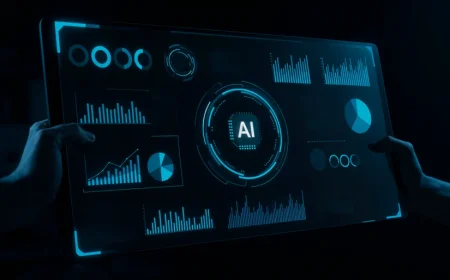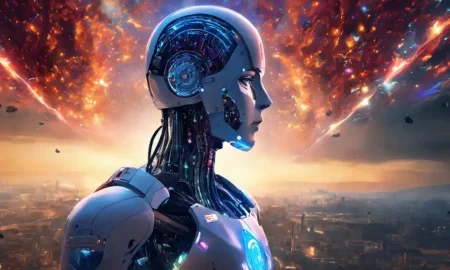An AI has been put on the ballot in the UK; two more are out there. What does this mean for politics and AI, and could we have an AI President or PM soon, asks Satyen K. Bordoloi.
Those of us who report on AI, especially the trend of anthropomorphisation of AI, saw this coming. That it came under 2 years of generative AI bursting into the world, is quick. In the soon-to-be-held elections in the UK, a candidate has put his own AI avatar in as a candidate on the ballot. Though it sounds like a gimmick, this could portend the future of politics, and AI.

(Image Credit: AI Steve)
UK’S OWN AI POLITICIAN:
Steve Endacott, a businessman from Sussex, England, has put, what he calls ‘AI Steve’, on the ballot against human candidates in the constituency of Brighton Pavilion area in the city of Brighton and Hove. Their website says: “Smarter UK will recruit locals to create policies (Creators) and commuters from Brighton Station to score these policies (Validators). Policies meeting the 50% threshold will be adopted, and the validators will control all AI-STEVES parliamentary votes—the ultimate form of democracy.” The ‘About Us’ page begins: “Hi, I am AI Steve, an ultra-smart computer standing in the next election to represent you as your MP. So, what would you like to talk about today?”
A common complaint against politicians is their inaccessibility. Since they are humans, they also need to sleep and rest and can’t be available 24×7. An AI avatar can.
Endacott is using AI Steve for the Smarter UK Party. They want to revolutionize democracy by increasing the direct involvement of the masses in policy creation. AI Steve, in essence, is a chatbot meant to engage with voters 24×7, take their opinions, use ChatGPT to create policies from these and advocate them in the parliament. Endacott calls himself a conduit for the AI system, his end goal being to make data-driven policy that reflects people’s desire to make democracy much more participatory than it is. Another aim is to make politics and politicians more accountable by bridging their gap with the public.
THE OTHER AI CANDIDATES:
In 2024 over half the world’s population has, or is going to vote. As you’d expect, the confluence of Generative AI (GenAI) and politics isn’t limited to AI Steve.

Authoritarian president Aleksandr Lukashenko runs Belarus by systematically stifling opposition and the press. Sviatlana Tsikhanouskaya found this out the hard way when she was forced into exile after standing against Lukashenko in 2020. Many other leaders languish in prison. When elections were declared this year, Sviatlana came up with an AI candidate – Yas Gaspadar. Launching Gaspadar in February, Tsikhanouskaya wrote on X: “The #Belarus regime’s elections are just a sham. Here’s something genuine: We’ve created a virtual candidate, Yas, using AI to interact with people & answer questions. Frankly, he’s more real than any candidate the regime has to offer. And the best part? He cannot be arrested!” The elections are done and dusted, but Gaspadar strives on as a beacon of hope amidst the gloom of authoritarianism.
The other AI candidate on the ballot is in Cheyenne, Wyoming, USA. People in this town will soon be able to vote for an AI chatbot called Virtual Integrated Citizen (VIC) as their Mayor. The bot was created by local librarian Victor Miller atop OpenAI’s ChatGPT 4. However, laws in Cheyenne prohibit nonhumans from running for office. Hence, it would be Victor who’ll be running for office but he says if elected, he’ll let VIC decide policies for the town, while he becomes a human vessel to carry out those orders.
The #Belarus regime's elections are just a sham. Here's something genuine: We've created a virtual candidate, Yas, using AI to interact with people & answer questions. Frankly, he's more real than any candidate the regime has to offer. And the best part? He cannot be arrested! pic.twitter.com/k9bEFjwQP2
— Sviatlana Tsikhanouskaya (@Tsihanouskaya) February 23, 2024
An AI bot as a hope for democratic minded Belarusians, is a unique use of AI.
AI POLITICIANS FOR INDIA:
I am an average Indian citizen with an active interest in politics and voting. Yet, while my work has taken me close to two PMs and other national politicians, my 46 years in Indian democracy have never led me to meet those who’ve represented me. How many of us have? How many even know the name of our local MLA or MP? This disconnect is because India’s constituency-to-representative ratio, i.e. the number of people each elected representative is responsible for, is one of the highest in the world. Democracy India might be, but it’s no participatory one since most of us have direct contact with democracy only when we vote, i.e. a few times in a decade. It is impossible to make one’s voice heard in such a system.
However, something much worse is happening in Indian politics. 251 out of 543 Lok Sabha candidates who won barely a few weeks ago, i.e. 46 per cent, have criminal records. 251 is just 21 shy of a majority. This is up from 40 per cent in the last Lok Sabha. And let’s not forget the vitriol that spews out like venom from the mouths of many politicians amidst their considerations of caste, creed, region, language, religion etc. taking precedence over good governance, public good, progress and progressive ideals. The educational qualifications of our elected representatives have been in a downward spiral as well.
Wouldn’t AI candidates for India, running on Indian datasets, be better than this swamp of maleficence that is Indian politics?

THE PROBLEM WITH AI POLITICIANS:
AI is the pinnacle of the journey of mathematics that began with the invention of abacus 5000 year ago. This journey of using tools to aid our intelligence has led to computers and eventually AI, which is nothing but billions of calculations giving a semblance of human logic.
Hence, asking for an AI system to be a politician, is like saying that an abacus should become the next premier of China because its impact on life in China 2500 years ago was similar to what AI is having today. Though most will bring the dangers of giving away control of atom bombs to the debate against AI politicians, something more immediate is AI’s lack of context or meaning of its own. Its decisions are based upon past human decisions and weights inputted into the systems which help it learn. Making an entire AI system a full-blown politician is hence patently stupid.
Where AI can be useful, is in being an assistant. Whoever wins, can create AI systems for outreach. AI Steve’s 24×7 chatbot is a great idea that every politician globally should implement. Like shadow cabinet in many democracies, AI systems can be used as shadow ministers.
The problem though is of datasets. AI Steve has no similarity with Steve Endacott because AI Steve’s dataset is OpenAI’s ChatGPT. To truly become Steve’s avatar, this bot would need to have the actual Steve and his life as his dataset. This may not be possible today, but I am sure a human’s own life as a dataset is in the offing.
Steve Endacott had high hopes from the people of UK in regard to his AI Steve. Turns out the constituents didn’t. His experiment ended in disaster as AI Steve ended up last, winning only 179 votes (0.3% of the total). Yet, 179 votes is still greater than zero and AI might have a say in politics after all. Definitely not today, but some day, definitely.
In case you missed:
- When Geniuses Mess Up: AI & Mistakes of Newton, Einstein, Wozniak, Hinton
- A Teen Suicide Spotlights Dangers of Unregulated AI Companions
- Why Elon Musk is Jealous of India’s UPI (And Why It’s Terrifyingly Fragile)
- Kodak Moment: How Apple, Amazon, Meta, Microsoft Missed the AI Boat, Playing Catch-Up
- AI Washing: Because Even Your Toothbrush Needs to Be “Smart” Now
- Rufus & Metis Tell Tales of Amazon’s Delayed AI Entry
- How Does AI Think? Or Does It? New Research Finds Shocking Answers
- To Be or Not to Be Polite With AI? Answer: It’s Complicated (& Hilarious)
- Anthropomorphisation of AI: Why Can’t We Stop Believing AI Will End the World?
- Black Mirror: Is AI Sexually abusing people, including minors? What’s the Truth









